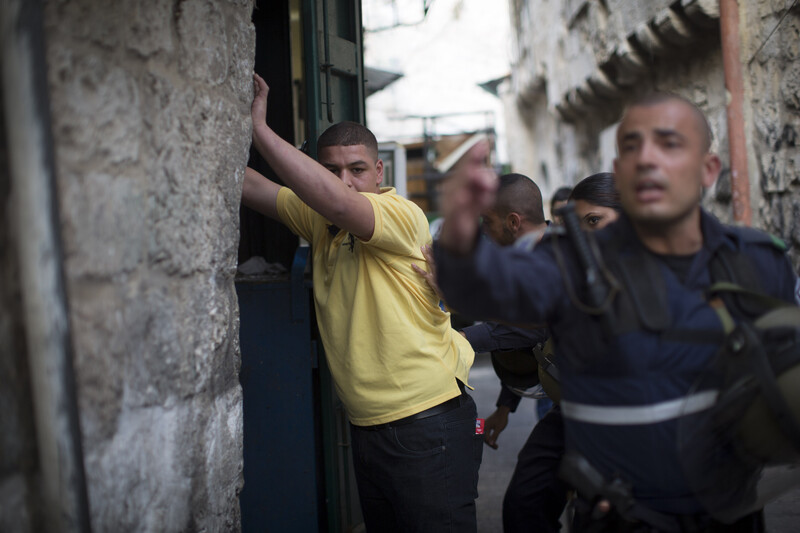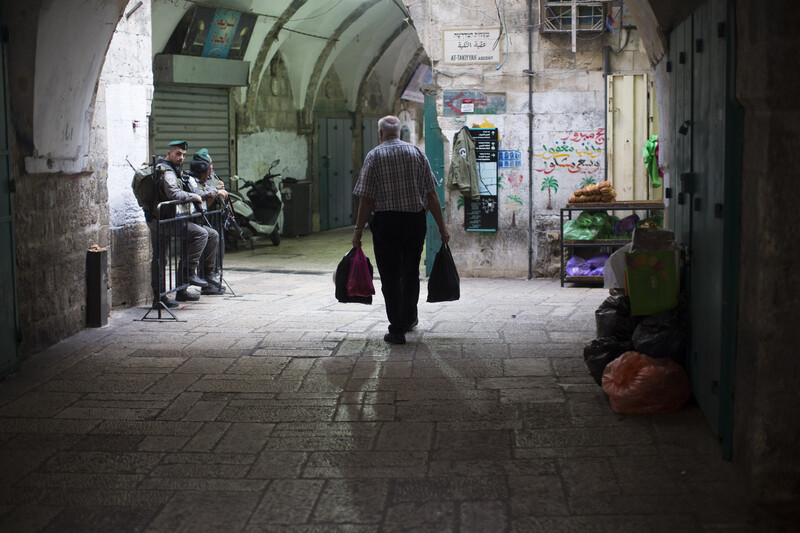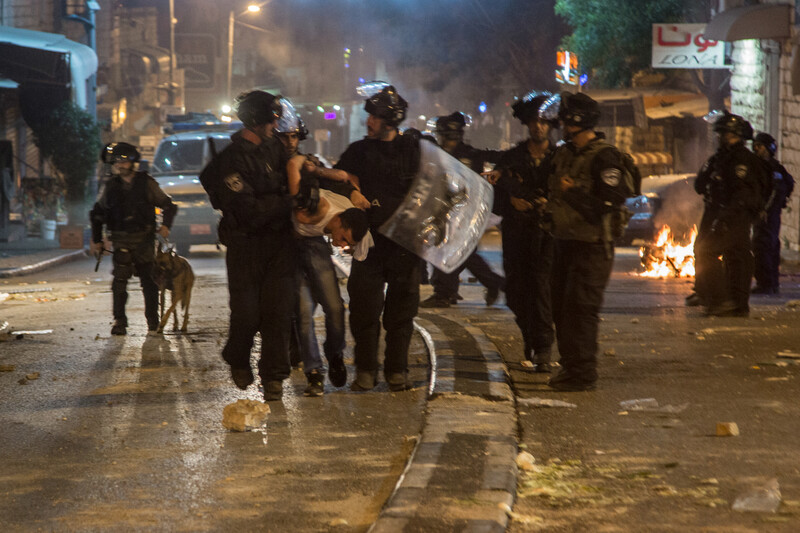The Electronic Intifada 21 October 2015

Israeli police detain a Palestinian youth in Jerusalem’s Old City on 12 October.
ActiveStillsIsraeli settlers in occupied Jerusalem are urging the authorities to step up their harassment of Palestinians by introducing New York-style law enforcement tactics.
In an attempt to crush Palestinian resistance, the settlers want to see a “zero tolerance” policy pursued, under which stiff penalties would be imposed on anyone defying Israel’s orders.
Daniel Luria, a spokesperson for the settler group Ateret Cohanim, is arguing that the Israeli authorities model their approach on the “broken windows” one favored by Rudy Giuliani, mayor of New York City from 1994 to 2001.
“Giuliani, I don’t think in the beginning went after the rapists and the murderers,” Luria told The Electronic Intifada, “he went after the small things.”
Based on the theory that all crime would fall if minor offenses were prosecuted aggressively, the “broken windows” approach led to a racially discriminatory form of policing.
In 2000, more than 50 percent of all adults arrested for misdemeanors in New York City were African-Americans. Yet African-Americans comprised less than one quarter of the city’s population at the time.
Ateret Cohanim’s calls chime with those made by senior figures in Israel’s ruling coalition.
Prime Minister Benjamin Netanyahu, for example, has declared “war” on Palestinian stone-throwers.
As well as loosening restrictions on when Israeli forces may open fire at stone-throwers, a new law has been approved to allow stone-throwers to be locked up for a maximum of 20 years.
Even before these measures, stone-throwing was the single most common charge leveled against Palestinian children in Israeli military courts, which deny defendants basic rights of due process. Israeli settlers accused of the same offense almost always escape without charge.
“Act like the owner”
Luria suggested that his group’s demands are part of wider efforts to step up Israel’s colonization of Jerusalem.
“In Hebrew it’s called a bal habayit — act like the owner,” he said. “When you act like a true bal habayit, like you own the place, then you have the fear of your citizens also. Not just fear, but they understand that a person’s sitting on top of you.”
Ateret Cohanim is not alone in recommending that New York-style tactics be used in Palestine. Writing in The Times of Israel, a right-wing website, Likud politician Danny Danon last year praised New York’s crackdown on “everything from graffiti to prostitution” and claimed “this is what is needed now in Jerusalem.”
He made it clear that the approach he advocated would primarily target Palestinians in occupied East Jerusalem. “We must immediately end the soft hand of law enforcement in the eastern neighborhoods that has endured for too long,” he wrote.

A Palestinian man walks past a police checkpoint in Jerusalem’s Old City on 12 October.
ActiveStillsThen a member of Israel’s parliament, the Knesset, Danon was subsequently appointed Israel’s ambassador to the United Nations.
Israel’s policing techniques already bear many similarities to those of the United States.
In recent weeks, the Israeli military and police have increased their presence in the Muslim Quarter of Jerusalem’s Old City.
While the deployment of extra forces has been presented by Netanyahu as a response to the stabbing of some Israeli settlers, many Palestinians have complained of being arrested or punished on charges completely unrelated to stabbing incidents.
The invasive searches which Palestinians have to endure can be compared to the “stop and frisk” techniques introduced by Bill Bratton, who was New York police commissioner in the 1990s. Such techniques have disproportionately affected people of color.
While the Israeli police have stated that they are subjecting Palestinians in East Jerusalem to “arrest raids” on a daily basis, some government ministers are calling for even greater aggression. Naftali Bennett, the education minister and a long-standing activist in Israel’s settler movement, is among those pushing for a higher police presence in East Jerusalem.
Intimidation
Palestinian shopkeepers in Jerusalem’s Old City have also complained of intimidation by the Israeli authorities.
The authorities have begun imposing fines of 5,000 shekels ($1,300) on Palestinian shopkeepers over regulations that had not been previously enforced.
As a result, stores have been punished because of outdoor displays and for lacking “no smoking” signs.
Khaled Mustafa Tufah, a shopkeeper in the Old City, witnessed five cases of Israelis punishing his colleagues one morning last week.
Arguing that shopkeepers “have the right to show off their stocks,” he said that the authorities have “a new excuse, that you should put none of your stuff outside.”
“They don’t give them [shopkeepers] a chance to take it in or out,” he said. “They just start to fine.”
An Old City café owner, who asked to be identified only as Abu Omar, said, “It’s ugly to see all the time guns and soldiers around, it’s not normal … I worry for my children every time they leave the house.”
An unusually high police force presence has been noticed, too, in towns within present-day Israel that have large numbers of Palestinian residents.

Police arrest a protester during clashes between youth and Israeli forces in Nazareth, a town in northern Israel, on 8 October.
ActiveStillsProtesters against Israel’s recent killings of Palestinians have faced increased repression.
Adalah, a civil rights group, has calculated that 150 young Palestinian citizens of Israel were arrested for attending demonstrations during the first two weeks of October.
Israeli police are enforcing rules in a discriminatory way by, among other things, issuing large numbers of fines on people who park their cars near protests.
“It’s legal, you cannot stop police from standing in Nazareth and giving tickets to people,” said Majd Kayyal, a spokesperson for Adalah. “But still it’s a kind of collective punishment to put pressure on people not to take part in demonstrations.”
Rebecca Pierce is an independent journalist and documentary filmmaker with a focus on militarization, borders, prisons and policing.



